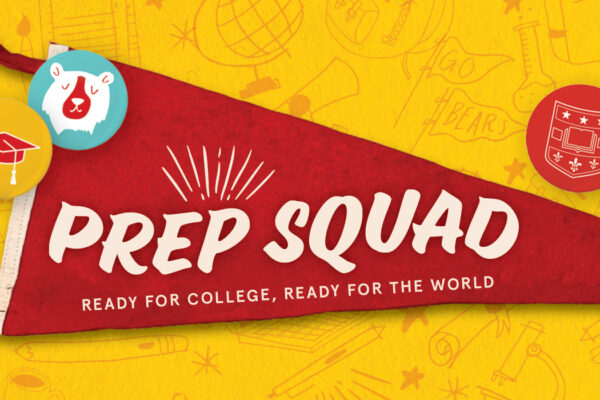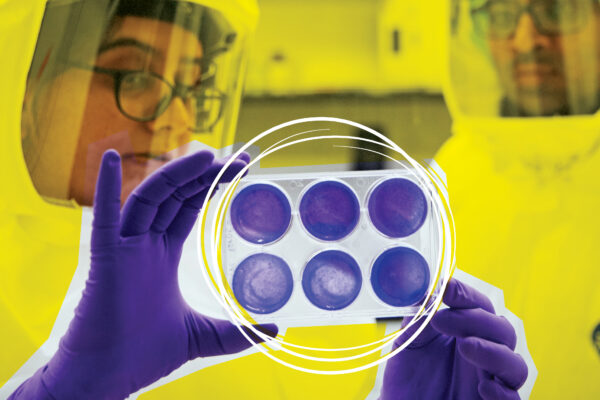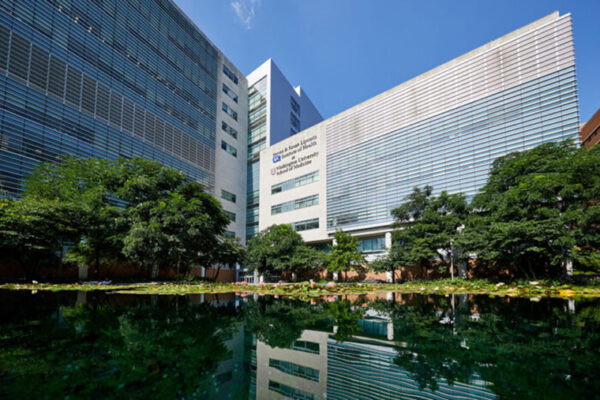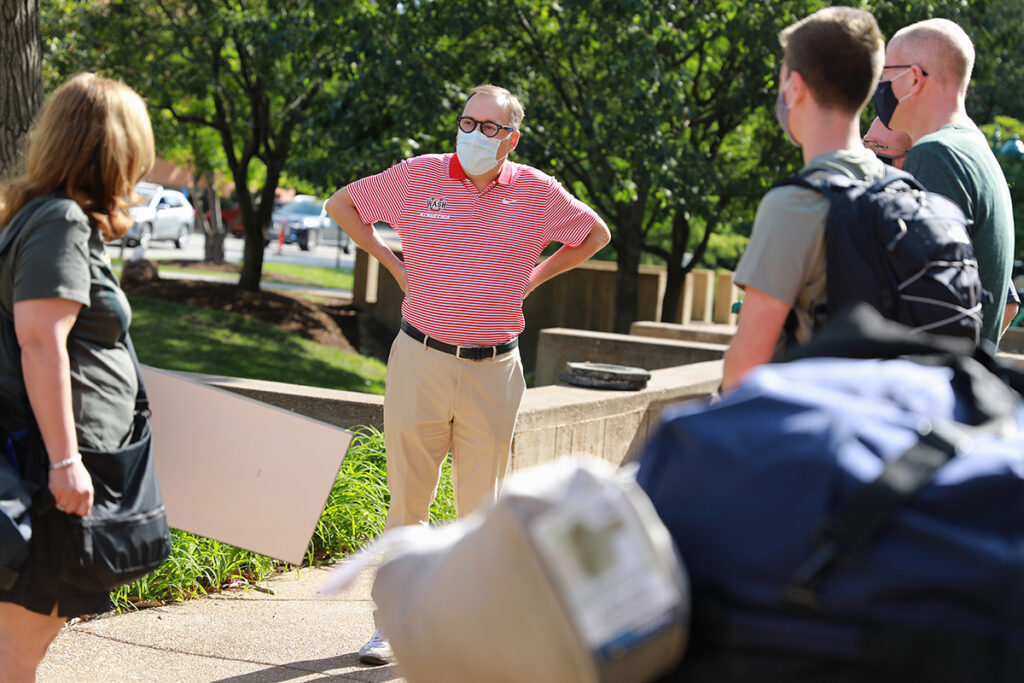
A letter from the chancellor
The COVID-19 pandemic has tested Washington University in St. Louis like no other crisis in our shared history. And we’re not out of the woods yet.
But through it all, we have stayed true to our vow to be “in St. Louis, for St. Louis.” In the past two years, Washington University has added new jobs, invested in construction, delivered world-class medical care, provided free tuition to low-income students from our region and pushed forward with vital research that benefits us all.
Our commitment to St. Louis starts with our students and our staff. We have increased pay and expanded benefits for our 17,360 employees and are proud that Forbes Magazine named Washington University the No. 1 employer in Missouri. Washington University also has made great strides to be more affordable through our new Gateway to Success initiative, a bold $1 billion investment in financial aid.
Washington University also increased its contribution to the local economy in 2021, spending $2.9 billion on salaries, construction, goods, and services and delivering $217 million in uncompensated medical care to patients in need. The university also drew $879 million in research funding to the region, money that rippled throughout the economy, creating new companies and jobs and supporting local businesses.
I am especially grateful to Washington University’s caregivers, the true heroes of the pandemic. They have worked tirelessly to treat victims of the virus and vaccinate the public. Our scientists are working to develop new tests and treatments. And our public health experts are helping local governments, school systems and cultural institutions keep St. Louisans safe as we try to return to “normal.”
And so while I know COVID continues to throw us curveballs, I also know the people of St. Louis and the members of the Washington University community will continue to rise to the challenge.
– Chancellor Andrew D. Martin

Keeping workers on the job
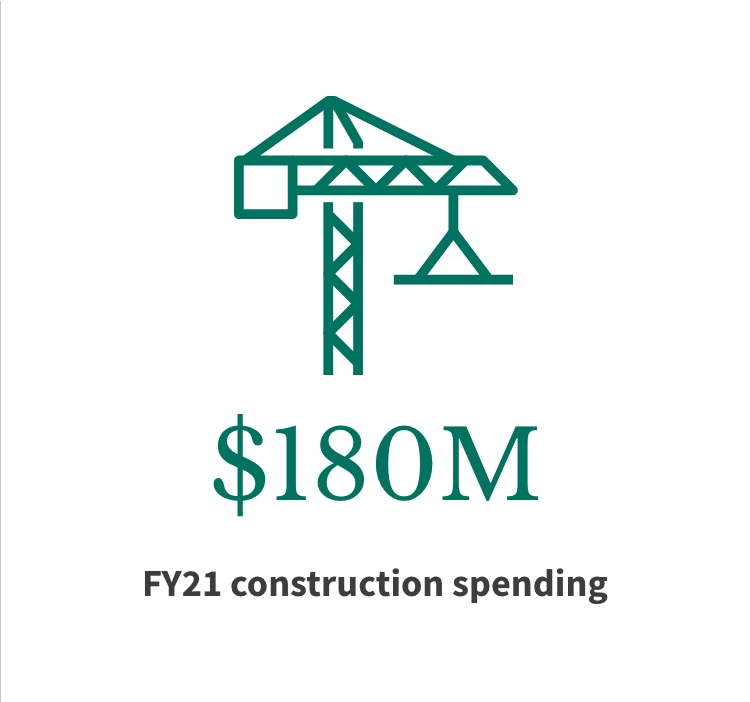
During these times of economic uncertainty, Washington University has been a stabilizing force, protecting the lives and livelihoods of its employees, vendors and partners. Now the region’s second largest employer, the university actually added some 1,000 jobs during the pandemic, increasing its workforce to 17,360 employees and its payroll to $1.8 billion. University employees pay $11.6 million in St. Louis City earnings tax.
The university also pushed ahead with the construction of the now-completed McKelvey Hall on the Danforth Campus and School of Medicine’s neuroscience research building which is expected to be completed in 2023. The projects have employed some 750 construction workers and trade specialists. To keep workers safe, the university collaborated with McCarthy Building Companies Inc. to stagger start times, implement a masking policy and limit visitors to job sites.
“Our employees have mortgages to pay, kids to feed and families to take care of, so they were incredibly grateful that they were able to safely come to work, earn a paycheck and support themselves and their families — and the local economy,” said John Buescher, central region president of McCarthy Building Companies Inc. “Make no mistake, there were some inconveniences and some nervousness, but Washington University has been a terrific partner, working with us to keep the jobs going. We were able to work when so many were not able to.”

Fighting on the frontlines

When the COVID-19 pandemic hit the St. Louis region in March 2020, Washington University physicians were at the ready, thanks to weeks of meticulous planning. Over the ensuing months, they have continued to fight an exhausting battle against the virus and adapt as new information becomes available. A fierce sense of mission and responsibility kept them going. This is what they had trained to do.
As of January 2022, Washington University physicians have treated more than 21,000 patients with COVID-19 at Barnes-Jewish Hospital and St. Louis Children’s Hospital.
“We had very little information in the beginning about how to treat this disease, so our physicians had to think on their feet when the answers weren’t available through limited existing research and clinical accounts of others confronting the virus,” said William J. Powderly, MD, the Dr. J. William Campbell Professor of Medicine and co-director of the Division of Infectious Diseases. “The creativity, flexibility and dedication our health-care providers have shown in the face of this novel and sometimes deadly virus has been extraordinary. They are true heroes, and their expertise has saved the lives of thousands of residents in our region.”

Supporting local businesses and nonprofits
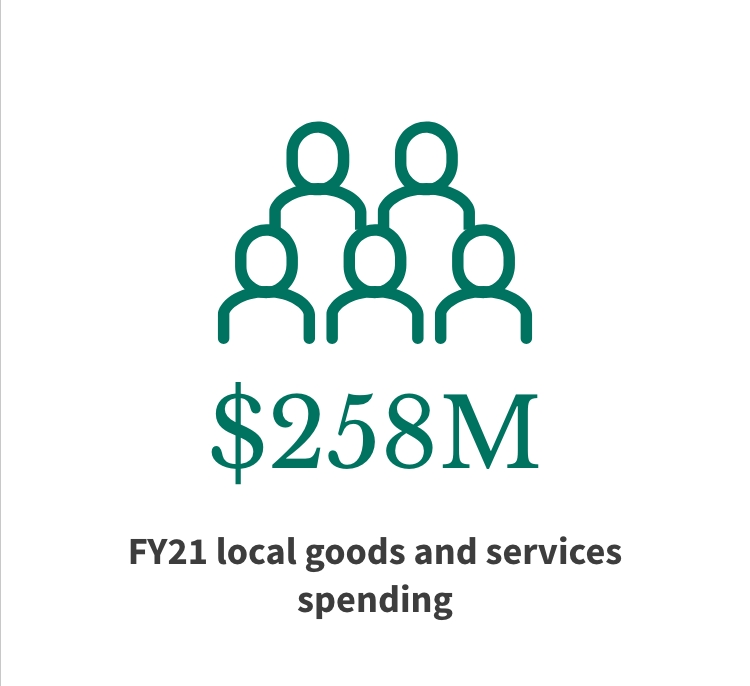
Washington University has mobilized to help the amazing communities, schools and businesses that we are privileged to counts as neighbors.
To support local businesses, the university contributed to community organizations, waived rent for struggling commercial tenants and ordered 3,500 meals from Delmar Loop restaurants to feed local first responders. Returning Washington University students also helped many local businesses rebound and, in 2021, students spent more money in the community than ever – $201 million.
“At first, I had no idea if we would even survive,” said Nudo House owner Qui Tran. “WashU came through with a weekly order that allowed me to pay rent and meet payroll. Their support and solidarity was a lifeline.”
The university’s Institute from School Partnership (ISP) also worked with the University City School District and other schools to create online science labs, provide virtual learning resources and support educators experiencing trauma. In addition, ISP worked with the Little Bit Foundation to develop and distribute free STEM learning activities for area children and developed an innovative COVID curriculum that helped middle and high school students make sense of the science of the virus.
“In good times and bad, we know we can lean on the Institute for School Partnership to help us achieve our goals for University City students,” said Michael Peoples, principal of University City High School.

Keeping vulnerable communities safe
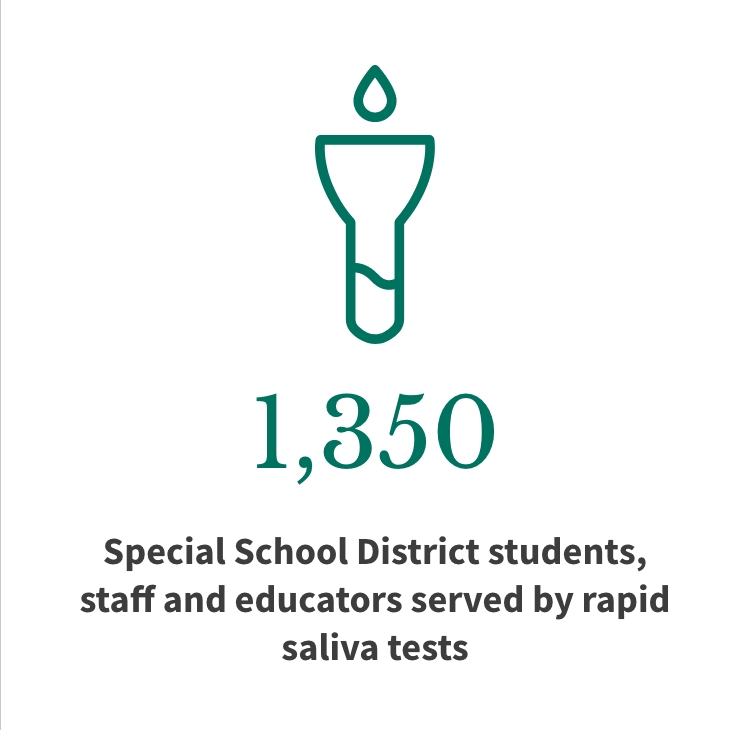
In the early months of the pandemic, a highly skilled team of researchers at the School of Medicine developed a saliva test to detect the virus that causes COVID-19. The test, faster and easier to tolerate than the nasal swab test, received emergency use authorization from the Food & Drug Administration. It is highly sensitive to detecting even tiny levels of the virus and returns a result in under a day. Washington University adopted the saliva test to screen its undergraduates on a biweekly basis, helping to keep the campus – and the St. Louis community – safe.
Rapid saliva test screenings — aimed at early detection of the virus — also were shown to contribute to exceedingly low transmission of the virus in the six schools overseen by the Special School District of St. Louis County, the largest specialized education provider in Missouri.
“Ample, fast testing was key to detecting COVID-19 infections and allowing in-person instruction to resume within this high-risk school community,” said Jason Newland, MD, a professor of pediatrics who has advised multiple school districts in Missouri during the pandemic. “A return to campus was important because the pandemic has disproportionately impacted students with intellectual and developmental disabilities.”

Investigating treatments for COVID-19
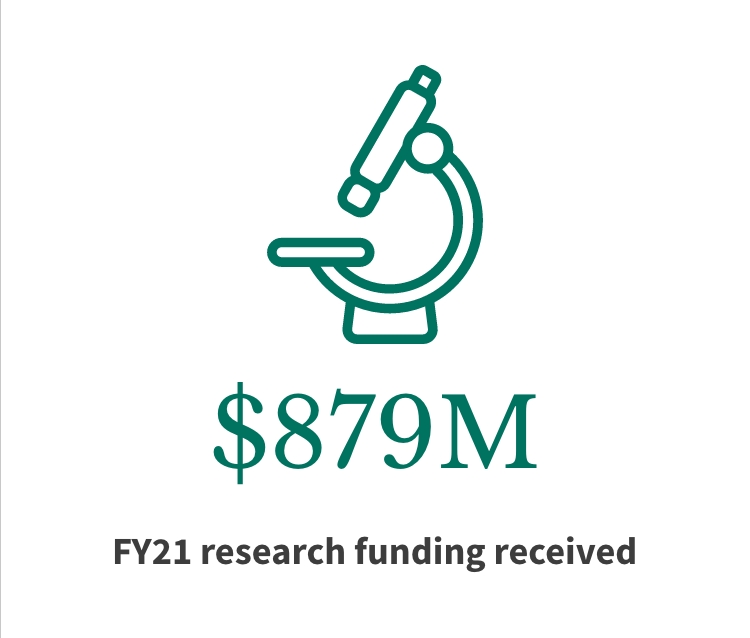
In the face of a global pandemic, research labs at the School of Medicine retooled to investigate how the virus causes disease and to develop drugs, vaccines and diagnostics to curb its destructive effects.
Additionally, the school’s informatics scientists created models to find hot spots of infection in the St. Louis region, predict the spread of the virus and guide public health interventions. And physicians quickly set up clinical trials to evaluate whether therapies and preventives designed for other conditions could be repurposed for COVID-19.
Their work was supported, in part, by $45 million in grants from the National Institutes of Health specifically for COVID-19 research.
“It’s been pretty intense,” said virologist Michael Diamond, MD, PhD, the Herbert S. Gasser Professor of Medicine, of the long hours that researchers have spent in their labs. He and his colleagues have been working to develop a nasal vaccine for COVID-19. “For us, it’s exhausting, but our labs at Washington University are making a contribution. We’re doing something. And that’s worth a lot.”

Expanding educational opportunities
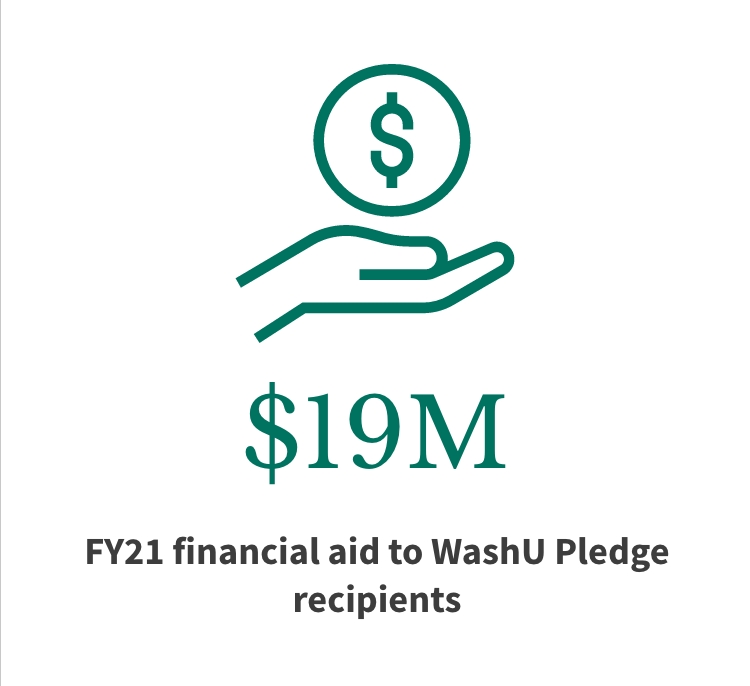
Washington University is taking big, bold steps to be more accessible to students from our region. In October, the university announced the Gateway to Success initiative, a $1 billion investment in new scholarships for undergraduate and graduate students.
Washington University also is proud of the success of its WashU Pledge initiative which, in its first two years, has provided free tuition, housing, books and other living expenses to 171 students from Missouri and Southern Illinois who are Pell Grant-eligible or come from a family with $75,000 or less in annual income.
“WashU was high on my list but I hadn’t planned on applying early decision because I wasn’t sure if I’d be able to make the money work,” said sophomore Elise Thompkins who graduated from Pattonville High School and is studying psychological and brain sciences in preparation for a career in occupational therapy. “The WashU Pledge really made WashU possible for me.”
In addition, 173 local students have graduated from the university’s College Prep Program, an innovative effort that helps talented first-generation students with limited financial resources get to and through college. The program is provided at no cost to students and their families.
“As a scholar, it was so nice to have a community that wanted to see me succeed and had faith in me,” said College Prep graduate Mackenzie Hines-Wilson, who went on to attend Washington University on a full scholarship. “The program is like a family, and like all good families we want the best for each other — no matter what comes next.”
